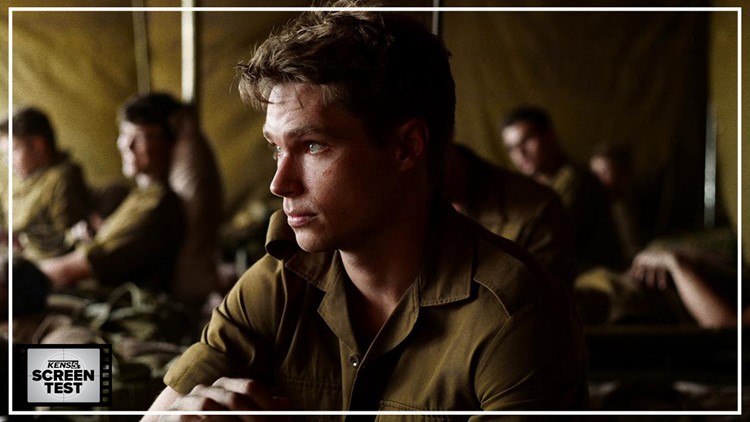Vivid but somewhat dramatically monotone, “Moffie,” the new work from filmmaker Oliver Hermanus, opens with the implication that it will be a staunch exploration of apartheid—the legalized practices of segregation which defined South Africa (Hermanus’s home country) for much of the 20th century. This isn’t exactly the case, despite our early witnessing of a trainload of white teens eagerly leaning out windows to berate a Black man minding his own businesses, a scene inflaming our fury both because of what we’re seeing and also because of our uneasy feeling that it’s so stitched into the fabric of the times. This isn’t the first time the boys have engaged so casually in racism, we know, and this isn’t the first time the man has been on the receiving end of government-sanctioned hatred.
From that point on, however, “Moffie” emerges not as a story centered on the dehumanization of Black South Africans during the apartheid era, but rather on the empathy-starved soil of military boot camp from which hatred so easily sprouted, where quiet moments between the cacophonous barking of insults quickly become a haven, and where the inability to conform to a homogenized ideal of heterosexual masculinity is met, at best, with a bruised cheek or broken nose. Realized with gorgeously grim atmosphere and a palpable cruelty cracking the exteriors of even the most hardened of boys arriving to begin their conscripted two-year military assignment – a requirement of all white South African adolescents in the early 1980s, when “Moffie” is set – Hermanus’s movie is mostly effective in depicting how hatred was drilled into the souls of young men at the time.
But this is also a movie where the political and the personal are intertwined. Because our lens into this military camp where commanders violently taunt rather than inspire is Kai Luke Brummer’s Nicholas van der Swart, a gay man of quiet stature who hopes keeping to himself is enough to see him through the next two years, “Moffie’s” most pressing question becomes whether intimacy and compassion can bloom where it’s being actively suppressed. Sensual images of shirtless young men tangling with each other as Nicholas’s unit plays Spin the Bottle not in a game of erotic match-making, but to determine which two will fight each other, injects “Moffie” (whose title refers to a derogatory Afrikaans term for a gay man) with a hefty bit of irony, as if the unit understands capitulating to naked closeness of their bodies will see them through a miserable point in their lives. It makes for some beautifully composed, emotionally anodyne sequences compensating for certain stretches of “Moffie” where the general aimlessness of the story is more tedious than involving.
At the same time, Hermanus never shuns the psychological trials Nicholas and his fellow military trainees are enduring; one of the film’s most startlingly tragic moments uses a burst of violence to punctuate a painless volleyball scene that had so confidently lulled us into a sense of false security with how it plays like a “Top Gun” homage. In “Moffie,” cinema’s past isn’t enough to shelter the audience from the horrors of fairly recent history.
The most purposeful sequence in “Moffie,” however, comes almost exactly midway through its 104-minute runtime, dipping into Nicholas’s past as a child visiting a community pool with his parents. Over the course of several minutes, we follow the young boy as he passes by other families, enters the wash room to rinse off and innocently observes a man washing himself before another man notices, aggressively takes his arm and leads him away. It’s an expertly constructed scene unfolding in what appears to be a single long take, and in a time when the stylistic maneuver garners oohs and ahhs for the aesthetic wonder, here it’s what cinematographer Jamie Ramsay’s efforts do narratively that is absorbing, frightening and incredible to behold. It runs the gamut of our sympathies, emphasizing how quickly candid curiosity can give way to cruelty in a time and place where cruelty against gay people, as well as Black people, was so prevalent.
Nothing that comes after as gripping or emotionally attuned as that recollection, but it does help inform the rest of a film that refrains from doing very much to define Nicholas beyond someone endeavoring to retain himself amid the barbed-wire political contexts of South Africa’s apartheid era. Brummer puts in a graceful and sensitive performance, but grace and sensitivity aren’t quite enough to keep “Moffie” from stumbling over itself when it comes time in the third act for Nicholas to reckon with his complicity, however mandatory, in racist systems. A moment that finds him staring down who the government has deemed the enemy yields little of the emotional interrogation Hermanus seems to be going for.
The numbness might very well be the point. That Nicholas remains a mostly anonymous figure right up until the credits – and that “Moffie” shortchanges us on catharsis in its otherwise beautifully realized ending – fits the idea that there’s only so much of himself he can recognize once it’s been sifted through two years of brutal abuse, strictly withheld identity and widespread disdain that will become relegated to history books within a few years’ time.
"Moffie" is not rated. It's available on VOD platforms beginning Friday.
Starring: Kai Luke Brummer, Wynand Ferreira, Matthew Vey
Directed by Oliver Hermanus
2021
MORE REVIEWS:
- ‘Slalom’ Review: Frostbitten French drama examines abuse in the world of amateur athletics
- ‘The Unholy’ Review: An invocation for a mostly forgettable faith-themed horror mystery
- ‘Godzilla vs. Kong’ Review: A blockbuster to make up for a year of lost blockbusters
- ‘Better Days’ Review: Evocative anti-bullying PSA isn’t much interested in being an anti-bullying PSA
- ‘Nobody’ Review: Bob Odenkirk breaks very, very, very bad in ultraviolent revengepedition
- ‘The Inheritance’ Review: The specificities of Black pride are woven into a dynamic diorama
- 'Come True' Review: Nightmarish premise sleepwalks through the payoff
- 'The Father' Review: A shape-shifting dementia drama is elevated by one of Anthony Hopkins's best performances



